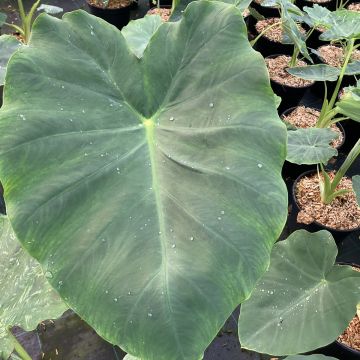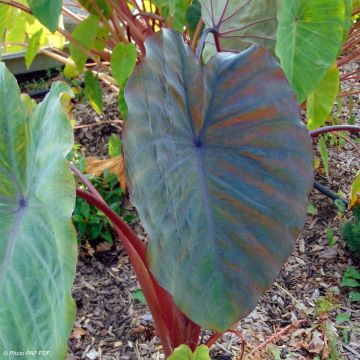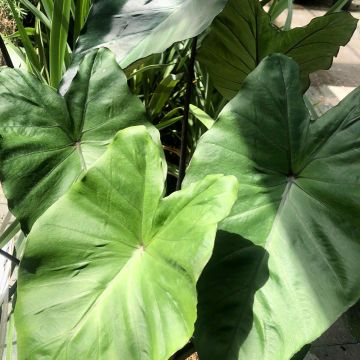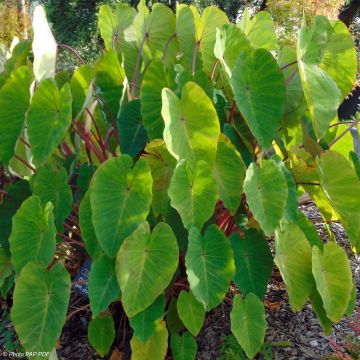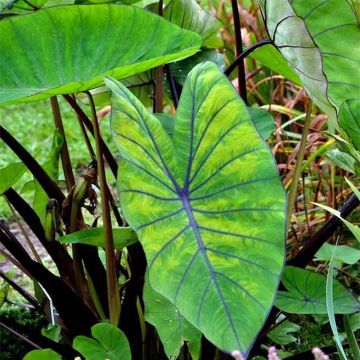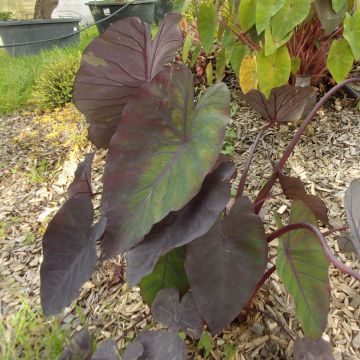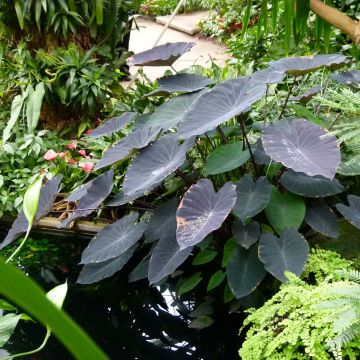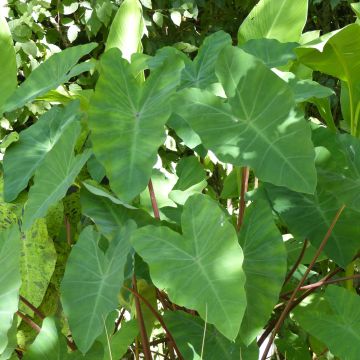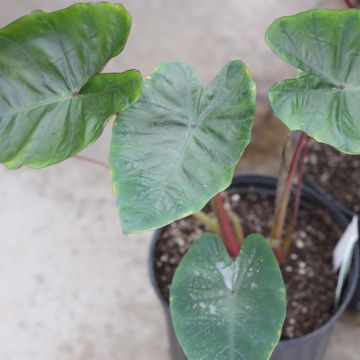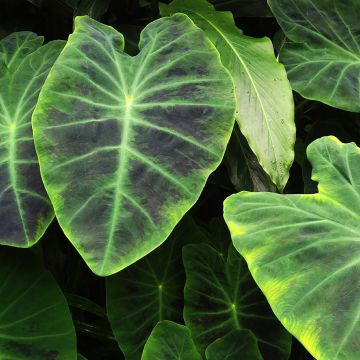Shipping country and language
Your country of residence may be:
Your country of residence is:
For a better user experience on our website, you can select:
Your shipping country:
Andorra
Austria
Belgium
Bulgaria
Canada
Chile
Croatia
Cyprus
Czechia
Denmark
Estonia
Finland
France
Germany
Greece
Hungary
Iceland
Ireland
Italy
Latvia
Lithuania
Luxembourg
Malta
Monaco
Netherlands
Poland
Portugal
Romania
Slovakia
Slovenia
Spain
Sweden
Switzerland
United Kingdom
We only deliver seed and bulb products to your country. If you add other products to your basket, they cannot be shipped.
Language:
French
German
Spanish
English
My Account
Hello
My wish lists
Plantfit
Log in / Register
Existing customer?
New customer?
Create an account to track your orders, access our customer service and, if you wish, make the most of our upcoming offers.
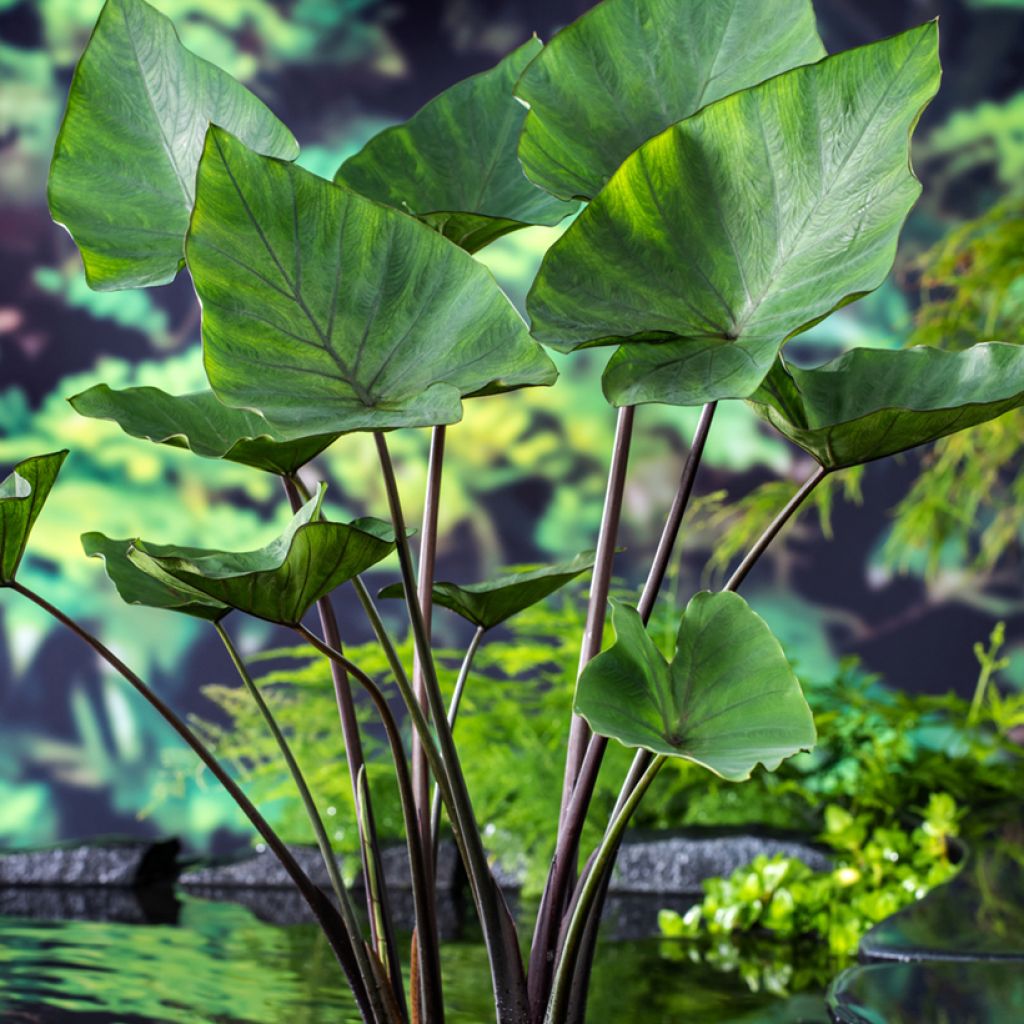

Colocasia esculenta Jack's Giant - Elephant Ears
Colocasia esculenta Jack's Giant - Elephant Ears
Colocasia esculenta Tea cup
Taro, Elephant's Ear, Dasheen, Eddoe
Why not try an alternative variety in stock?
View all →Order in the next for dispatch today!
Dispatch by letter from 3,90 €.
Delivery charge from 5,90 € Oversize package delivery charge from 6,90 €.
More information
This item is not available in your country.
Shipping country:
Andorra
Austria
Belgium
Bulgaria
Canada
Chile
Croatia
Cyprus
Czechia
Denmark
Estonia
Finland
France
Germany
Greece
Hungary
Iceland
Ireland
Italy
Latvia
Lithuania
Luxembourg
Malta
Monaco
Netherlands
Poland
Portugal
Romania
Slovakia
Slovenia
Spain
Sweden
Switzerland
United Kingdom
Schedule delivery date,
and select date in basket
This plant carries a 12 months recovery warranty
More information
We guarantee the quality of our plants for a full growing cycle, and will replace at our expense any plant that fails to recover under normal climatic and planting conditions.
From 5,90 € for pickup delivery and 6,90 € for home delivery
Express home delivery from 8,90 €.
Would this plant suit my garden?
Set up your Plantfit profile →
Description
Colocasia esculenta 'Jack's Giant' is a cultivar of Elephant Ear closely related to the species, with giant leaves. This plant, which exceeds the size of a man when grown in the ground, seems to be struck by gigantism and attracts attention with its disproportionate, shiny, elongated heart-shaped foliage. More hardy than it seems, this tropical perennial can withstand at least -8°C (17.6°F) in the ground, under a thick protective mulch. It is an absolutely stunning plant, essential for creating a lush and exotic decor in the garden, on a terrace or a patio.
Colocasia esculenta Jack's Giant belongs to the arum family, just like the Ethiopian arum and the philodendron. Probably originating from India, its ancestor, the Colocasia esculenta, also known as Edible Taro, spread a long time ago in the tropical regions of South America and Oceania, and later in tropical Africa. This rhizomatous perennial plant is a cousin of Arums and Ipomoeas, and it belongs to the arum family. The 'Jack's Giant' cultivar is an imposing herbaceous perennial plant that develops from a tuberous rhizome, forming a scaly corm covered with thick skin. The mature plant often exceeds 2m (7ft) high and 1.80m (6ft) in diameter. It is composed of magnificent bright bluish-green leaves, in the shape of an arrowhead, that can vary in darkness, highlighted by chartreuse green along the edges, and veined with a lighter green. The leaf blade can reach 1m (3ft) long and 80cm (32in) wide, carried by a long light green petiole, sheathing at the base. The leaf surface allows water to slide off with its good water-repellent properties. During its growth, the plant produces very few shoots, but the root grows larger every year, allowing it to remain compact. If you remove an old leaf, two new ones take its place. The vegetation is destroyed as soon as it freezes, but the plant regrows from its crown in late spring, if kept almost dry.
In the garden, on the terrace, or in the house, Colocasia esculenta 'Jack's Giant' is an impressive yet easy-to-grow plant. It appreciates a sunny or semi-shaded exposure and proves to be hardy under thick protective mulch, which is quite an achievement for a tropical plant! It stands out as a focal point in contemporary or exotic decor, whether planted on a terrace in a large container or along the edges of a pond, in favourable climates. This voracious plant gets along well with arums, banana plants, Gunnera, or tree ferns, whose magnificence recalls ancient forests. Some gardeners lift the crown after the first frost, overwinter it in a dry, dark place, and then replant it in April-May in a mixture of garden soil and compost.
True taro is consumed in Africa, China, Polynesia, and several other parts of the world. Its tubers are rich in starch and its young leaves are eaten like spinach.
Flowering
Foliage
Plant habit
Safety measures
Botanical data
Colocasia
esculenta
Tea cup
Araceae
Taro, Elephant's Ear, Dasheen, Eddoe
Colocasia antiquorum var. esculenta, Caladium esculentum, Colocasia antiquorum var. euchlora, Arum esculentum, Colocasia antiquorum
Cultivar or hybrid
atteintescutaneomuqueuses
Cette plante peut provoquer l'apparition de réactions cutanées indésirables, une atteinte des yeux, ou des difficultés respiratoires si elle est ingérée.
Ne la plantez pas là où de jeunes enfants peuvent évoluer. Evitez tout contact avec la peau: privilégiez l'emploi de gants pour la manipuler. En cas de contact, lavez-vous soigneusement les mains et rincez abondamment à l'eau la zone concernée. Lavez les vêtements entrés en contact. En cas de réaction cutanée, contactez votre médecin ou le centre antipoison le plus proche de chez vous. En cas d'atteinte étendue ou de difficultés respiratoires, appelez immédiatement le 15 ou le 112.Pensez à conserver l'étiquette de la plante, à la photographier ou à noter son nom, afin de faciliter le travail des professionnels de santé.
Davantage d'informations sur https://plantes-risque.info
Other Elephant ears - Colocasia and Alocasia
Planting and care
Plant Colocasia esculenta Jack's Giant in a sunny position or partial shade. They need moist to wet, fertile and humus-rich soil and appreciate a nitrogen fertilizer. You can plant Colocasia in large containers, with regular and generous watering during the growing season, reduced in winter. If the atmosphere is too dry in winter, the plants may be attacked by red spider mites. Usually grown as greenhouse or conservatory plants, they are actually quite hardy perennials (down to -10°C (14°F)). You can grow them in the garden, mulching the crown well over winter. If the soil is waterlogged in winter, the rootstock may rot, so the soil will need to be well-drained. Watch out for attacks from slugs and snails that devour the young leaves.
Some gardeners lift the crown after the first frost, overwinter it in a dry, dark place, then replant it in April-May in a mixture of garden soil and well-rotted compost or horse manure. Daily watering will be essential in hot regions, both in the ground and in pots.
Planting period
Intended location
Care
This item has not been reviewed yet - be the first to leave a review about it.
Haven't found what you were looking for?
Hardiness is the lowest winter temperature a plant can endure without suffering serious damage or even dying. However, hardiness is affected by location (a sheltered area, such as a patio), protection (winter cover) and soil type (hardiness is improved by well-drained soil).

Photo Sharing Terms & Conditions
In order to encourage gardeners to interact and share their experiences, Promesse de fleurs offers various media enabling content to be uploaded onto its Site - in particular via the ‘Photo sharing’ module.
The User agrees to refrain from:
- Posting any content that is illegal, prejudicial, insulting, racist, inciteful to hatred, revisionist, contrary to public decency, that infringes on privacy or on the privacy rights of third parties, in particular the publicity rights of persons and goods, intellectual property rights, or the right to privacy.
- Submitting content on behalf of a third party;
- Impersonate the identity of a third party and/or publish any personal information about a third party;
In general, the User undertakes to refrain from any unethical behaviour.
All Content (in particular text, comments, files, images, photos, videos, creative works, etc.), which may be subject to property or intellectual property rights, image or other private rights, shall remain the property of the User, subject to the limited rights granted by the terms of the licence granted by Promesse de fleurs as stated below. Users are at liberty to publish or not to publish such Content on the Site, notably via the ‘Photo Sharing’ facility, and accept that this Content shall be made public and freely accessible, notably on the Internet.
Users further acknowledge, undertake to have ,and guarantee that they hold all necessary rights and permissions to publish such material on the Site, in particular with regard to the legislation in force pertaining to any privacy, property, intellectual property, image, or contractual rights, or rights of any other nature. By publishing such Content on the Site, Users acknowledge accepting full liability as publishers of the Content within the meaning of the law, and grant Promesse de fleurs, free of charge, an inclusive, worldwide licence for the said Content for the entire duration of its publication, including all reproduction, representation, up/downloading, displaying, performing, transmission, and storage rights.
Users also grant permission for their name to be linked to the Content and accept that this link may not always be made available.
By engaging in posting material, Users consent to their Content becoming automatically accessible on the Internet, in particular on other sites and/or blogs and/or web pages of the Promesse de fleurs site, including in particular social pages and the Promesse de fleurs catalogue.
Users may secure the removal of entrusted content free of charge by issuing a simple request via our contact form.
The flowering period indicated on our website applies to countries and regions located in USDA zone 8 (France, the United Kingdom, Ireland, the Netherlands, etc.)
It will vary according to where you live:
- In zones 9 to 10 (Italy, Spain, Greece, etc.), flowering will occur about 2 to 4 weeks earlier.
- In zones 6 to 7 (Germany, Poland, Slovenia, and lower mountainous regions), flowering will be delayed by 2 to 3 weeks.
- In zone 5 (Central Europe, Scandinavia), blooming will be delayed by 3 to 5 weeks.
In temperate climates, pruning of spring-flowering shrubs (forsythia, spireas, etc.) should be done just after flowering.
Pruning of summer-flowering shrubs (Indian Lilac, Perovskia, etc.) can be done in winter or spring.
In cold regions as well as with frost-sensitive plants, avoid pruning too early when severe frosts may still occur.
The planting period indicated on our website applies to countries and regions located in USDA zone 8 (France, United Kingdom, Ireland, Netherlands).
It will vary according to where you live:
- In Mediterranean zones (Marseille, Madrid, Milan, etc.), autumn and winter are the best planting periods.
- In continental zones (Strasbourg, Munich, Vienna, etc.), delay planting by 2 to 3 weeks in spring and bring it forward by 2 to 4 weeks in autumn.
- In mountainous regions (the Alps, Pyrenees, Carpathians, etc.), it is best to plant in late spring (May-June) or late summer (August-September).
The harvesting period indicated on our website applies to countries and regions in USDA zone 8 (France, England, Ireland, the Netherlands).
In colder areas (Scandinavia, Poland, Austria...) fruit and vegetable harvests are likely to be delayed by 3-4 weeks.
In warmer areas (Italy, Spain, Greece, etc.), harvesting will probably take place earlier, depending on weather conditions.
The sowing periods indicated on our website apply to countries and regions within USDA Zone 8 (France, UK, Ireland, Netherlands).
In colder areas (Scandinavia, Poland, Austria...), delay any outdoor sowing by 3-4 weeks, or sow under glass.
In warmer climes (Italy, Spain, Greece, etc.), bring outdoor sowing forward by a few weeks.
